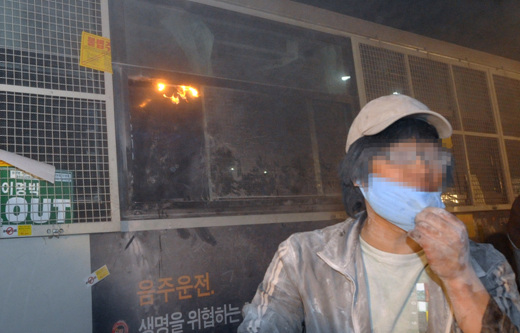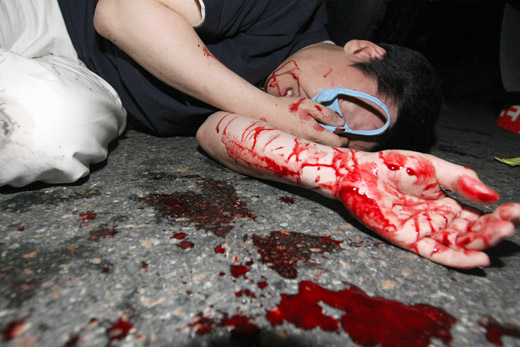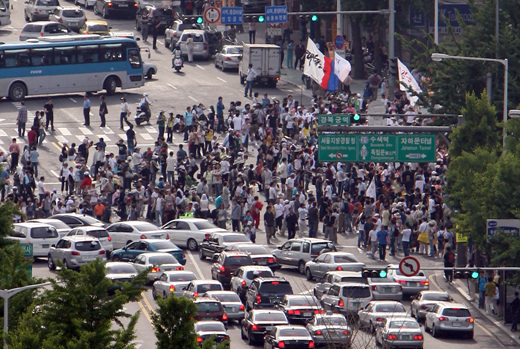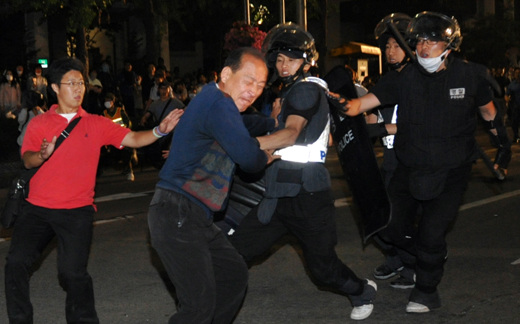Robert Koehler has an excellent link to a blog from a Korean-American that lays out the Korean perspective in regards to the Cows Gone Wild US beef issue. I do not agree with some of his conclusions, but he has made the most rational arguments I have seen yet from the Korean perspective. His overarching conclusion in the posting is that the US beef issue has little to do with actual US beef, but more to do with how Korean President Lee Myung-bak is governing the country and handling of the beef issue. His criticism of how Lee handled the beef issue in regards to how it was presented the public are valid but to claim the protests going on now are anti-Lee and not anti-US beef I do not agree with.

Protester trying to set riot police bus on fire.
The anti-Lee Myung-bak theme I increasingly see being promoted by the anti-US groups because I believe the anti-US groups have to frame this issue as an anti-Lee Myung-bak issue and not an anti-American issue because the foreign media is beginning to take notice of what is going on. If the anti-US groups kept arguing their non-sensical reasons to deny US beef imports the foreign media would shred their arguments and make these people a global laughing stock. So now they are attempting to frame it as an anti-Lee issue.
However, if this was an anti-Lee issue then why are they still demanding non-sensical US beef import regulations? The fact is that the protest leaders are saying it is an anti-Lee issue in order to obscure the issue with the foreign media and score political points against Lee while the average Korean on the street still thinks he is genetically disposed to mad cow disease and that the US government is intentionally trying to kill Koreans:
Cha Yoon-min, 13, marched on City Hall on Saturday night with his mother, a lawyer in Seoul. “I am afraid of American beef,” he said. “I could study hard in school. I could get a good job and then I could eat beef and just die.” [Washington Post]

Image from Korea Beat. I have to wonder if this guy was injured by the riot police or from projectiles thrown by fellow protesters?
This sure doesn’t sound like anti-Lee Myung-bak reasoning to me. The average Korean is still being drawn to these protests because they think that US beef is dangerous and that added regulations needed to be added the import agreement even though these demands have no basis in fact. I recommend you read the Ask A Korean posting referred to above to debunk many of the myths, but one of the biggest ones is that the US doesn’t allow over 30 month old beef to imported into the country which is simply not true:
That rule also designated Canada as the first minimal-risk country recognized by USDA. The expansion of that rule is a major step in facilitating fair, science-based trade while continuing to protect animal health in this country, consistent with international standards as defined by the World Organization for Animal Health, also known as the OIE.
Specifically, this rule allows for the importation of: cattle and bison for any use born on or after March 1, 1999 — the date determined by USDA to be the date of effective enforcement of the ruminant-to-ruminant feed ban in Canada; blood and blood products derived from bovines, collected under certain conditions; and casings and part of the small intestines derived from bovines.
Today’s final rule also lifts a delay imposed in March 2005 on meat and meat products from bovines older than 30 months of age.
Meat and meat products from bovines older than 30 months of age will be allowed, provided specified risk materials are removed prior to importation. [USDA website via TMH]

Korean mob blocks traffic in downtown Seoul.
Notice the decision by the USDA to accept cattle from Canada over 30 months in age is based off of science and not Internet scare mongering as we see right now going on in Korea. The prominent claim is that other developed countries do not accept beef over 30 months in age so why should Korea? Once again this is simply not true:
After six years and with the threat of sanctions looming large, France has finally agreed to lift its embargo on imports of British beef, imposed in 1996 as a result of the BSE crisis.
The lifting of the import ban had been expected after the French food safety agency (AFSSA) last month announced that there was no public health reason to maintain the embargo, but it still comes three years after the EU authorities ruled that British beef was safe to eat.
The decision by French Prime Minister Jean-Pierre Raffarin to lift the embargo will help ease Franco-British relations, but the real reason for the change of mind was the threat of sanctions imposed by the European Court of Justice as a result of France’s illegal actions in maintaining the ban after the Commission lifted the EU-wide ban on British beef in 1999. (…)
France also accused the UK of being the only EU country not to test cattle aged over 30 months, those considered to be the most at risk from BSE because of its long incubation period. But the change of government, and more importantly, the AFSSA report, prompted a change of heart in France, and while Paris still has some concerns, exports of British beef can at least resume. [Food Navigator Europe]

Young Korean mandatory service conscripts being attacked by grown men acting like spoiled children.
France and other European Union nations are accepting beef over 30 months in age without 100% testing of all the cattle from the United Kingdom which is the country where mad cow disease started and was a large epidemic that actually did kill people unlike America and Korea where no one has died from eating American beef.
The most hypocritical aspect of the mob’s demands are that they are demanding the US to implement safety measures they are not willing to implement on their own domestic beef industry. Korea is not a member of the OIE which is global regulatory agency in regards to beef safety. Since Korea does not allow inspections by the OIE, the United States beef is considered safer then Korean beef for consumers. The need for Korea to join the OIE is quite apparent considering KBS caught Korean cattle ranchers selling sick cows on the blackmarket and feeding cows with feed that causes mad cow disease.
It appeared early on the Lee Myung-bak government would be able to advance Korea to meet global standards in a number of areas to include trade, but as we have seen with the US beef issue facts mean nothing to a mob and Lee Myung-bak has now allowed the mob to establish government policy despite all the facts that say otherwise. This all bodes very badly for the Lee Myung-bak Presidency that is barely 100 days old.
COMMENTS............................................................................................................
I really wish more sources back home were picking up on this. And it’s absolutely impossible to call these protests primariy about LMB. There are plenty of legit reasons to protest the import of American beef or to protest the President—not that I necessarily agree with them—but what’s transparent to any foreigner living over here is that the issue of Mad Cow Disease was created OUT OF THIN AIR to drum up public support among those who may have been quiet. I don’t understand why—again—this is so clear to the bloggers over here but overlooked by the media sources back home.I understand that the beef issue is tied in to LMB, but seriously, I’m totally at a loss as to how people can divorce this from latent anti-American feelings ESPECIALLY after what has transpired over the years. Man, I really want people back home to pick up on this.
Brian on June 4th, 2008I did a post on this the other day:
usinkoreajournal.wordpress.com/2008/06/03/1980s-revisited-indeed-anti-us-or-anti-dictatorship/
I linked it to a page I did a couple of years ago on common misconceptions about the lack of anti-US sentiment prior to the Kwangju Massacre.
My argument is that anti-US activity has been significant in Korean society going back to 1945 - but it is more difficult to analyze because it overlapped greatly with anti-authoritarian government sentiment.
In short, protest against things like Park Chung-Hee’s harsh rule were also protests against the US in Korea, because the two were viewed as one in the same.
Today, it is a little different, but claiming anti-US activity isn’t really anti-US activity but anti-Blue House is an echo of the past.
usinkorea on June 4th, 2008I wonder if the guy in that photo is really injured at all. As some commenters at Korea Beat said it does kind of look like stage blood.
I figured thevpublic would turn on Lee — South Korean presidents always seem to sweep in on a wave of popularity and then spend years with low approval ratings — but this kind of speed is ludicrous. It was only months ago that he won a crushing victory at the ballot box. People who voted for a guy nicknamed Bulldozer can’t complain that he doesn’t take the time to nicely explain everything for them. On the other hand, he is responsible for getting caught flatfooted on this issue and not quickly addressing the bad science behind all the propaganda.
1 comment:
The Pres. Lee argument is ultimately bullshit, because people are taking the fact that Lee is a part of the issue and trying to use it to blow a mountain of heavy smoke to confuse the view of outsiders.
And since it shouldn't be hard to make clear counter arguments, it makes the attempt to protect the motives of Korean society = BS.
For example ---
We could look back to Pres. Roh's time in office:
His approval rating was terrible.
And he did things that were against popular opinion - and the opinion of the left and right.
He sent Korean troops to Afghanistan and Iraq. He cut the FTA. And he cut a beef deal (only to hamper implementing it for months and months).
He also sent regular army soldiers and a massive amount of riot troops to battle with die-hard leftists at Pyongtaek.
So....I find it hard to believe that Lee's low popularity ratings and "arrogant" decision-making against the "will of the people" is what caused Cows Gone Wild!! Hysteria...
The beef deal has sent Koreans scurrying in the street for two months ---- but hated-Roh sending troops to Iraq only gathered a smattering of the usual small scale protests....
Sure....
Post a Comment